Yves GARY Affichages : 3787
Catégorie : 1903 : DEFI N°12
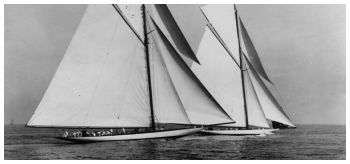 LE CHALLENGER SURCLASSÉ
LE CHALLENGER SURCLASSÉ Sept. 03, 1903 - Reliance a remporté sa troisième course contre le troisième Shamrock hier, et il conserve la Coupe de l'America.
Sept. 03, 1903 - Reliance a remporté sa troisième course contre le troisième Shamrock hier, et il conserve la Coupe de l'America.
"Successful Defender of America's Cup." The result of this third race was a foregone conclusion, for in the first and second races the defender demonstrated so decisively her superiority that the final victory was scarcely more than a formality to comply with the terms of the mutual agreement.
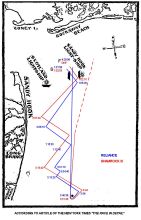 THE RACE IN DETAIL (pas de traduction)
THE RACE IN DETAIL (pas de traduction)True, she suffered similarly in the two ineffectual attempts that preceded the final triumph of the American boat, but in those fiascos the feeble airs prevailing offered her admirers the opportunity to explain her poor showing by admitting that she was outclassed by Reliance in a drifting match. No such excuse, however, can be made for her performance yesterday. The race, if race it can be called, was not a drifting match. The wind was light at the start, but it freshened soon after, and over nine-tenths of the course came in the shape of a good whole-sail breeze. The sea was remarkably smooth over most of the way to the outer mark, though it took on quite a jump before the turn. On the homestretch, the wind rose to nearly fifteen miles an hour. The conditions therefore were such as to give Shamrock a chance to show speed if there was any speed in her. She would undoubtedly have shown speed alongside of the oldest Shamrock, but the Reliance simply romped away from her.
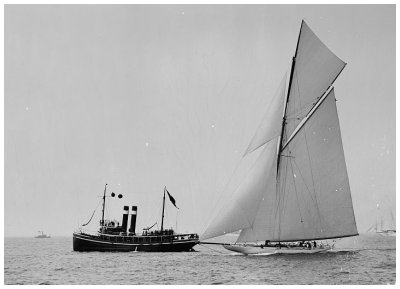 When the light air that had been moving over the surface of the ocean took on the semblance of a breeze and the Regatta Committee indicated by signals that a windward course would be laid south from the Sandy-Hook Lightship, the Reliance and Shamrock cast off their tow lines and began to parade with each other on opposite sides of the line. The committee boat Navigator had anchored about a quarter of a mile west of the lightship. The Reliance stood to and fro between the two marks on the southern or windward side of the line, while the Shamrock deployed in like manner on the northern or leeward side.
When the light air that had been moving over the surface of the ocean took on the semblance of a breeze and the Regatta Committee indicated by signals that a windward course would be laid south from the Sandy-Hook Lightship, the Reliance and Shamrock cast off their tow lines and began to parade with each other on opposite sides of the line. The committee boat Navigator had anchored about a quarter of a mile west of the lightship. The Reliance stood to and fro between the two marks on the southern or windward side of the line, while the Shamrock deployed in like manner on the northern or leeward side.
Immediately before the preparatory signal, at 12:45, they were both reaching eastward with booms well off on the port hand. Shamrock was leading, but the Reliance was fully a third of a mile to windward. Each carried her biggest club topsail and a jib topsail one size larger than the baby. The Shamrock’s mainsail was a little puckered about the clews, but it set better than on any previous appearance. Shamrock wore to the northward and westward of the lightship, and Reliance almost at the same time to the southward and eastward. That move placed Reliance some distance away on the weather bow of the Shamrock. Thus they stood westward toward the Navigator. The wind was blowing from three to four knots, but it had some weight, and the yachts moved with a noticeable curl of foam under their bows.
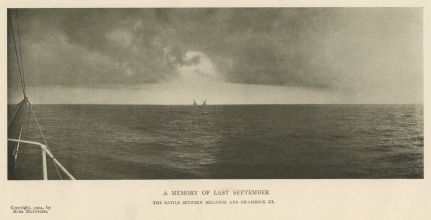 After the preparatory signal Reliance tacked to starboard a few lengths to westward of the lightship. Shamrock held on to the westward until about halt way between the two marks, then shot up into the wind as if about to tack, but after shaking her headsails a few seconds paid off again. Reliance speedily swung back to port and followed Shamrock. The latter was about three-quarters-of a mile to the west of the Navigator when the warning signal was given, at 12:55, and the Shamrock was leading by possibly one-third of that distance. Reliance, however, had edged off to the northward of Shamrock’s wake, and when Shamrock went about tacked under her lee bow. It looked as if Barr merely, wanted to show his opponent how easily he could extricate himself from the worse position, for Reliance quickly reached to the front and out on Shamrock's weather bow. Then Shamrock bore away; and Reliance did likewise. In that manner they headed back for the Navigator.
After the preparatory signal Reliance tacked to starboard a few lengths to westward of the lightship. Shamrock held on to the westward until about halt way between the two marks, then shot up into the wind as if about to tack, but after shaking her headsails a few seconds paid off again. Reliance speedily swung back to port and followed Shamrock. The latter was about three-quarters-of a mile to the west of the Navigator when the warning signal was given, at 12:55, and the Shamrock was leading by possibly one-third of that distance. Reliance, however, had edged off to the northward of Shamrock’s wake, and when Shamrock went about tacked under her lee bow. It looked as if Barr merely, wanted to show his opponent how easily he could extricate himself from the worse position, for Reliance quickly reached to the front and out on Shamrock's weather bow. Then Shamrock bore away; and Reliance did likewise. In that manner they headed back for the Navigator.
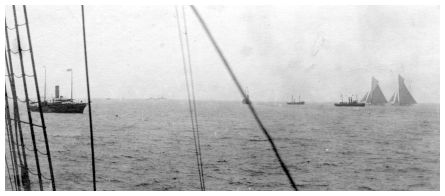 Reliance, still south of the line, made a sharp luff close to the bows of the Navigator, and, after hanging in the wind until the Shamrock reached up nearly abeam, paid off and came for the line close around that mark-boat. By that maneuver Barr made it impossible for Wringe to get the windward berth. He kept so close to the committee boat that Shamrock could not get between it and the Reliance. As the defender was passing the committee boat the starting signal was given, and the smoke of the gun wrapped a veil about her sails. Instead, however, of crossing at once, she breached eastward above the line for some distance. Shamrock, meanwhile, held back to avoid being crossed and placed under Reliance’s lee. Wringe undoubtedly, reasoned that, if he stood straight for the line, Barr would put Reliance about, cross Shamrock's bows, and take the windward berth. So he preferred to keep off and let Reliance get well away. But in doing that he handicapped his boat slightly.
Reliance, still south of the line, made a sharp luff close to the bows of the Navigator, and, after hanging in the wind until the Shamrock reached up nearly abeam, paid off and came for the line close around that mark-boat. By that maneuver Barr made it impossible for Wringe to get the windward berth. He kept so close to the committee boat that Shamrock could not get between it and the Reliance. As the defender was passing the committee boat the starting signal was given, and the smoke of the gun wrapped a veil about her sails. Instead, however, of crossing at once, she breached eastward above the line for some distance. Shamrock, meanwhile, held back to avoid being crossed and placed under Reliance’s lee. Wringe undoubtedly, reasoned that, if he stood straight for the line, Barr would put Reliance about, cross Shamrock's bows, and take the windward berth. So he preferred to keep off and let Reliance get well away. But in doing that he handicapped his boat slightly.
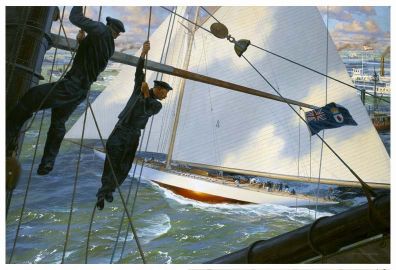 Here are the official times of the start: Reliance, 1:01:56; Shamrock, 1:02:00. The actual start of Shamrock was 1:02:03, so she was handicapped three seconds. Both crossed on the starboard tack, but Shamrock went to port at 1:02:10, almost as soon as she was over the line. Reliance held on the starboard tack until 1:03:20. When about she was somewhat astern, but well up to windward. It was almost at once apparent, however, that she was both outfooting and outpointing her adversary. Before they had been half an hour on the port tack the interest in the race as a race was over. The only element of interest left was as to the lead in minutes and seconds the Reliance would have at the outer mark.
Here are the official times of the start: Reliance, 1:01:56; Shamrock, 1:02:00. The actual start of Shamrock was 1:02:03, so she was handicapped three seconds. Both crossed on the starboard tack, but Shamrock went to port at 1:02:10, almost as soon as she was over the line. Reliance held on the starboard tack until 1:03:20. When about she was somewhat astern, but well up to windward. It was almost at once apparent, however, that she was both outfooting and outpointing her adversary. Before they had been half an hour on the port tack the interest in the race as a race was over. The only element of interest left was as to the lead in minutes and seconds the Reliance would have at the outer mark.
On this tack the yachts were heading for the Jersey beach in the neighborhood of Galilee, which is a short distance below Seabright, but Reliance was heading nearly a mile further than the Shamrock down the coast. The wind freshened considerably in the first half hour, and at 1:34 Reliance took in her jibtopsail to supplant it with a baby. The change was made in a minute and a half, pretty quick work. Shamrock, refusing to follow the example, held on to her larger jibtopsail.
 After holding the port tack for more than an hour Shamrock found herself among the fish pounds off the Jersey Beach. She weathered the pound off Galilee, where the shipwrecked sailors found safety last Sunday morning by making their frail cutter fast to a pile, but she was heading straight into the next pound about two miles below. The Reliance on her weather bow was well to windward of all the pounds in sight. Wringe had probably been informed that a southerly breeze generally cants to the westward along the beach, and would no doubt have liked to hold the port tack longer but the pounds ahead made it impossible, so at 2:07:40 he put Shamrock on the starboard tack. Reliance went to starboard at 2:08:10.
After holding the port tack for more than an hour Shamrock found herself among the fish pounds off the Jersey Beach. She weathered the pound off Galilee, where the shipwrecked sailors found safety last Sunday morning by making their frail cutter fast to a pile, but she was heading straight into the next pound about two miles below. The Reliance on her weather bow was well to windward of all the pounds in sight. Wringe had probably been informed that a southerly breeze generally cants to the westward along the beach, and would no doubt have liked to hold the port tack longer but the pounds ahead made it impossible, so at 2:07:40 he put Shamrock on the starboard tack. Reliance went to starboard at 2:08:10.
There was now a fine wholesail breeze and Reliance, besides being in the lead, was fully half a mile dead to windward. The yachts had been traveling at a lively pace. They had covered at least ten knots in little more than an hour, and they would have been very nearly in position to fetch the mark if the wind had not backed one point to south by east. The mark, however, was too far off shore to be seen from the locality where the yachts tacked. The freshening wind had stirred up the ocean, and as the yachts stood off shore on the starboard tack they took a rising sea on the starboard bow. The Reliance did not appear to splash any more water than the Shamrock, but she certainly was much steadier. The Shamrock rolled and wallowed considerably more. Her jib topsail was frequently shaking, but less from the roll of the sea than from its unsuitability to windward work in a fresh breeze.
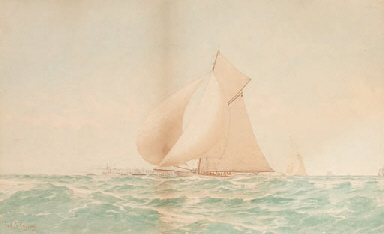 Shamrock kept the starboard tack a little less than half an hour. She went to port at 2:31:30 and Reliance followed her at 2:31:50. The latter was rapidly widening the gap between herself and the following challenger. The manner in which she was going ahead and to windward was a surprise even to those who had all along contended that what the challenger needed was a breeze and a seaway. A pool had been made up immediately after the start on the time between the two at the outer mark, and on the supposition that the weather would be light all but one of the guesses were between 12 and 25 minutes in favor of Reliance. The exceptional guess credited Reliance with 6 minutes, and when the wind freshened it was generally conceded that this would take the pool. Before the mark was raised, however, it became plain that the six-minute guesser was not in the game.
Shamrock kept the starboard tack a little less than half an hour. She went to port at 2:31:30 and Reliance followed her at 2:31:50. The latter was rapidly widening the gap between herself and the following challenger. The manner in which she was going ahead and to windward was a surprise even to those who had all along contended that what the challenger needed was a breeze and a seaway. A pool had been made up immediately after the start on the time between the two at the outer mark, and on the supposition that the weather would be light all but one of the guesses were between 12 and 25 minutes in favor of Reliance. The exceptional guess credited Reliance with 6 minutes, and when the wind freshened it was generally conceded that this would take the pool. Before the mark was raised, however, it became plain that the six-minute guesser was not in the game.
As the wind continued to freshen, Capt. Wringe at length concluded that the jibtopsail he had been carrying from the start, was too big for the occasion. He took it in at 2:43:30, but was two and a half minutes in getting out his baby, or exactly one minute longer than Barr had been in making the change. The Reliance went to starboard at 3:01:10, soon after the mark became visible, but as Shamrock did not follow, made only a short hitch. At 3:04:40 she returned to port. After being a little less than 10 minutes on the port tack she went to starboard at 3:13:20. This time Shamrock followed suit. She tacked to starboard at 3:13:40. but was a long way to leeward of the leader’s wake.
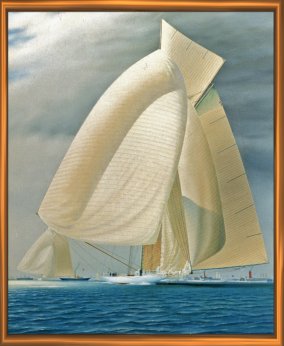 At 3:36 the Reliance tacked to port and headed for the mark. Less than a minute and a half later she took in her Jib topsail, and the ballooner that was to take its place on the run home was up in stops long before she made the turn. Shamrock was not in position to fetch the mark until 3:44, nearly three and a half minutes after Reliance had rounded.
At 3:36 the Reliance tacked to port and headed for the mark. Less than a minute and a half later she took in her Jib topsail, and the ballooner that was to take its place on the run home was up in stops long before she made the turn. Shamrock was not in position to fetch the mark until 3:44, nearly three and a half minutes after Reliance had rounded.
The times of the turn were: Reliance, 3:40:39; Shamrock, 3:51:46. The actual time between them was 11:07, and according to the official time of the start, the Reliance had gained 11:03, but allowing for Shamrock’s handicap, her real gain had been only 11 minutes. That, however, was, under the conditions, enough to satisfy the most enthusiastic admirer of the American boat. No other defender since the Volunteer had made so great a gain in the windward on a challenger for the cup in such a good sailing breeze. Nor, be it remembered, had the Reliance been able to make anything like the showing against either Columbia or Constitution under similar weather conditions.
Both yachts jibed booms to port and broke out balloon jibtopsails on rounding the mark. There was not much to choose between the manner in which they rounded the mark. Each made a very close and neat turn. Both were quick in getting out spinnakers to starboard, but Shamrock’s crew was a trifle the quicker. Reliance's spinnaker was broken out in 2:10 after rounding and the Shamrock's in 1:51, a difference in favor of the English crew of 25 seconds.
On the run as on the beat, the Reliance sailed faster than the Shamrock. She widened the gap continuously. Spinnakers were carried a little less than three-quarters of an hour. 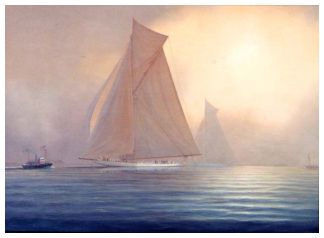 The wind backed at first to south-southeast and then to southeast, where it held steady to the finish. With the first change, about 4:19, a heavy fog bank came rolling in from the southeast. The Shamrock being far astern felt the change first and she doffed her spinnaker at 4:20. The spinnaker had scarcely disappeared before the fog overtook and shut her from sight. The Reliance took in her spinnaker at 4:22 and soon afterward she was lost also to view.
The wind backed at first to south-southeast and then to southeast, where it held steady to the finish. With the first change, about 4:19, a heavy fog bank came rolling in from the southeast. The Shamrock being far astern felt the change first and she doffed her spinnaker at 4:20. The spinnaker had scarcely disappeared before the fog overtook and shut her from sight. The Reliance took in her spinnaker at 4:22 and soon afterward she was lost also to view.
The accompanying fleet of revenue cutters, tugs, and yachts had begun a race for the lightship on the first appearance of the fog, but presently they disappeared in the fast pursuing gloom. Thenceforth their proximity could be guessed at only by the incessantly complaining steam whistles. The press tug Luckenbach fetched about three-quarters of a mile to the westward of the lightship but was able to pick it up by the sound of its whistle. The Navigator was finally discovered at anchor but the lightship did not become visible until later when the fog lifted somewhat.
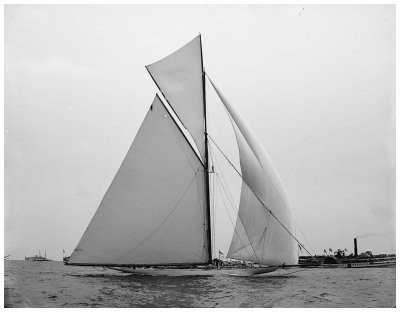 One by one the steam craft gathered about the lightship, and it was not very long before Reliance was descried coming with a smother of canvas aloft and a smother of foam under her bows. She was when made out about half a mile to the westward of the lightship, but not yet quite up to the line. Her lookout discovered the lightship about the same time as she was seen by the expectant fleet. She was given a sharp luff and the sheet of the bellying balloon jiptopsail let go to enable her to come up in the wind. The crew made smart work of getting the big sail in, for the breeze was piping at a rate close to fifteen miles an hour. A few seconds later she dashed across the line triumphant winner of the match of 1903.
One by one the steam craft gathered about the lightship, and it was not very long before Reliance was descried coming with a smother of canvas aloft and a smother of foam under her bows. She was when made out about half a mile to the westward of the lightship, but not yet quite up to the line. Her lookout discovered the lightship about the same time as she was seen by the expectant fleet. She was given a sharp luff and the sheet of the bellying balloon jiptopsail let go to enable her to come up in the wind. The crew made smart work of getting the big sail in, for the breeze was piping at a rate close to fifteen miles an hour. A few seconds later she dashed across the line triumphant winner of the match of 1903.
After more than half an hour's wait the Shamrock was made out to the northward and eastward of the lightship coming back toward the line under jib and mainsail, her staysail having been taken in. Without making an effort to finish, she doffed her club and took a line from the tug Cruizer. About the same time the Reliance, decorated with four big editions of the Stars and Stripes, started for the Hook in tow of the tug Guiding Star. As she drew out of the encircling fleet a shaft of sunlight broke through the fog and enveloped her like a halo of glory, and as if old Sol himself were determined to emphasize her triumph the halo followed her through the surrounding gloom for nearly five minutes.
The summary of the time follows:

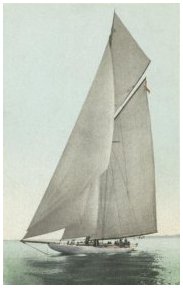
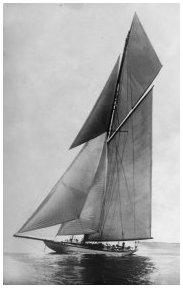
Reliance thus won three out of the five races and the series of 1903 was over. Lipton had tried as no man had tried before to win the Cup, but had failed. Indeed he did not come as close to winning as he had in 1901, with the Shamrock II and in the three races and all the unfinished trials of 1903 his boat was never ahead at any single mark of the course, after crossing the starting line.
His failure to win was a keen disappointment, but he took it in good part. Many Americans were also sorry to see him lose, as they felt that it might be a good thing for international racing if the Cup went back to England for a time. We had held it so long, and had defended it so successfully, that it rather frightened prospective challengers away, and it was felt that it would be a long time before another race for it would be held in this country.
